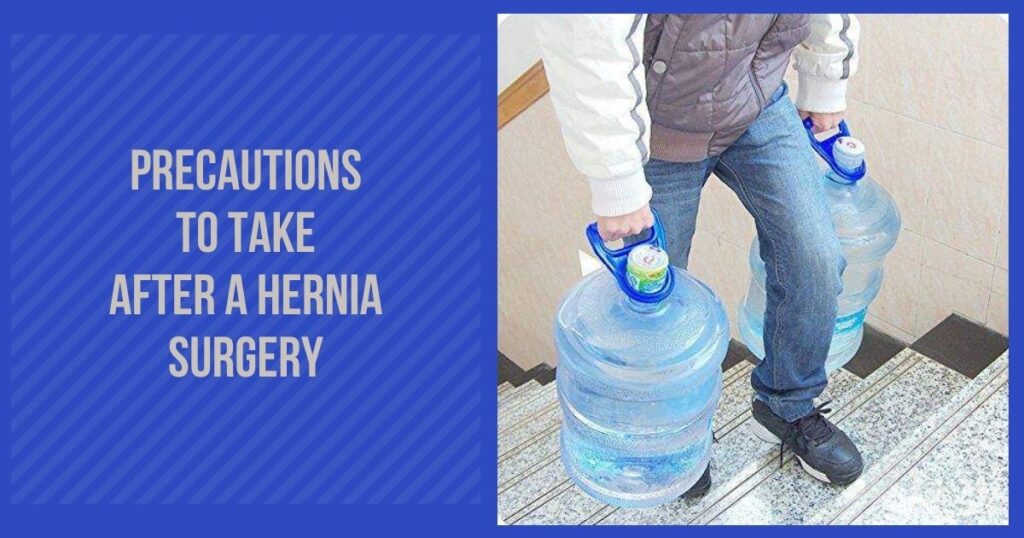After getting diagnosed with a hernia, many are hesitant to undergo surgery in the initial stages. But later when they learn the risks they have to live with and the life-threatening situation it might lead to, they opt to get surgically treated. Many have questions about resuming their normal routine after hernia surgery. Here are some of the do’s and don’t’s or the precautions one needs to take after hernia surgery.
Hernia Surgery – Laparoscopy or Open Surgery method
While a majority of patients undergo laparoscopic surgical methods to treat their hernias, some do undergo open surgical methods. This is a call taken by the hernia surgeon based on the complexity of the case. Typically, open surgical methods are more prevalent in patients with incisional hernias. Whatever might be the type of surgical method, the following are the precautions one needs to take after undergoing hernia surgery. The only difference is people who have undergone open surgical methods have to take extra precautions while they are recovering and the healing period is typically higher for them. Hence they might have to take precautions for a longer period of time.
Immediately after the hernia surgery
– The effect of anesthesia takes some time to wear off fully after the hernia surgery is completed. While local anesthesia might take a few hours to wear off, the effect of general anesthesia may linger for a day. That is why the patient is discharged after at least 3-5 days time if they have undergone a complicated open surgery.
– In the initial days of recovery, your hernia surgeon recommends liquid food. The consumption of solid food can be resumed once the surgeon gives a go-ahead. If you have undergone laparoscopic hernia surgery, you might be asked to resume solid food within a day’s time.
– Pain will be felt in the initial days. But the painkillers available these days can help you manage your pain. Mild, bearable pain might persist for a couple of days which is normal.
– Do not take bath immediately after open surgery. Only when the healing of the surgical wound is complete you are advised to take bath by the surgeon. You can wipe yourself with wet clothes over your other parts of the body. Take care not to touch the surgical wound area.
– Do not wear tight or rough clothes. When they accidentally rub the surgical wound area, it might interfere with the healing process.
– If you see any discharge from the surgical wound, do not panic. Just report to your surgeon or caretaker. They will properly clean the wound and redress it.
After getting Hernia Surgery – Long-term precautions
– You can resume normal solid food. However, as a precaution make your meal nutritious and full of fiber. If you are obese, take steps to reduce your weight. Because it is a known fact that if you are obese, the chances of hernia recurrence are higher.
– Avoid constipation. Do not take any food that can increase the chances of constipation. Include more fiber in your diet.
– Avoid cough and sneeze. Treat for your cold so that you do not sneeze often and strain the surgery done area
– Avoid squatting. Sitting on the floor, bending too much, etc can put you in a state of strain.
– Never lift too much weight if you are hitting the gym. Lift only moderate weights in the gym. Even moderate weight lifting can increase your muscle mass and keep you fit and healthy. Ask your hernia surgeon when you can resume your gym after the surgery. Your doctor might advise more after 6 months if you have undergone open surgery but lesser months if you have undergone laparoscopic hernia surgery.
– Never lift LPG cylinder, water can, bucket with water or wet clothes, heavy boxes or suitcases, etc. Most of them are uneven weights and can cause strain to your hernia surgery done area.
– You can resume your sexual activity after a few weeks or months after your hernia surgery. Some people might feel discomfort in the surgery done area. If you experience pain then go slow.
– Any activity that can put undue pressure on the abdomen muscles should be avoided altogether.
